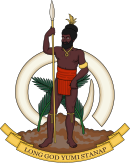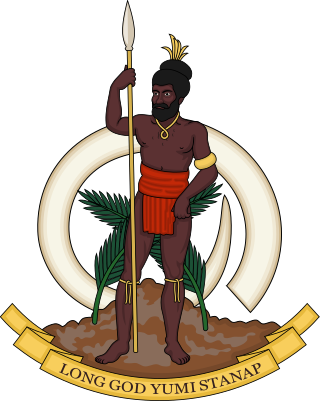 |
|---|
The 52 members of the Parliament of Vanuatu from 1998 to 2002 were elected on 6 March 1998.
 |
|---|
The 52 members of the Parliament of Vanuatu from 1998 to 2002 were elected on 6 March 1998.

Vanuatu maintains diplomatic relations with many countries, and it has a small network of diplomatic missions. Australia, France, Japan, New Zealand, the People's Republic of China, South Korea and the United Kingdom maintain embassies, High Commissions, or missions in Port Vila. The British High Commission maintained a continued presence for almost a century, though closed from 2005 until reopening in 2019.

A state of emergency is a situation in which a government is empowered to put through policies that it would normally not be permitted to do, for the safety and protection of its citizens. A government can declare such a state during a natural disaster, civil unrest, armed conflict, medical pandemic or epidemic or other biosecurity risk.

The Constitution of South Africa is the supreme law of the Republic of South Africa. It provides the legal foundation for the existence of the republic, it sets out the rights and duties of its citizens, and defines the structure of the Government. The current constitution, the country's fifth, was drawn up by the Parliament elected in 1994 in the South African general election, 1994. It was promulgated by President Nelson Mandela on 18 December 1996 and came into effect on 4 February 1997, replacing the Interim Constitution of 1993. The first constitution was enacted by the South Africa Act 1909, the longest-lasting to date. Since 1961, the constitutions have promulgated a republican form of government.

The Vanuatu men's national football team represents Vanuatu in international football, and is controlled by the Vanuatu Football Federation.
Representation of the People Act is a stock short title used in Antigua and Barbuda, The Bahamas, Bangladesh, Barbados, Belize, Ghana, Grenada, Guyana, India, Jamaica, Mauritius, Pakistan, Saint Vincent and the Grenadines, Trinidad and Tobago, the United Kingdom and Vanuatu for legislation dealing with the electoral system. Representation of the People Acts is a collective title for legislation relating to representation of the people, including Rating Acts and other Registration Acts. The title was first used in the United Kingdom in the 1832 Great Reform Act and was adopted in other countries of, or formerly part of, the British Empire through the spread of the Westminster parliamentary system.

The Constitution of the Republic of Singapore is the supreme law of Singapore. A written constitution, the text which took effect on 9 August 1965 is derived from the Constitution of the State of Singapore 1963, provisions of the Federal Constitution of Malaysia made applicable to Singapore by the Republic of Singapore Independence Act 1965, and the Republic of Singapore Independence Act itself. The text of the Constitution is one of the legally binding sources of constitutional law in Singapore, the others being judicial interpretations of the Constitution, and certain other statutes. Non-binding sources are influences on constitutional law such as soft law, constitutional conventions, and public international law.

United Nations Security Council resolution 1244, adopted on 10 June 1999, after recalling resolutions 1160 (1998), 1199 (1998), 1203 (1998) and 1239 (1999), authorised an international civil and military presence in the Federal Republic of Yugoslavia and established the United Nations Interim Administration Mission in Kosovo (UNMIK). It followed an agreement by Yugoslav President Slobodan Milošević to terms proposed by President of Finland Martti Ahtisaari and former Prime Minister of Russia Viktor Chernomyrdin on 8 June, involving withdrawal of all Yugoslav state forces from Kosovo.

Chinese nationality law details the conditions by which a person holds nationality of the People's Republic of China (PRC). The primary law governing these requirements is the Nationality Law of the People's Republic of China, which came into force on September 10, 1980.

There are five types of elections in the United Kingdom: elections to the House of Commons of the United Kingdom, elections to devolved parliaments and assemblies, local elections, mayoral elections, and police and crime commissioner elections. Within each of those categories, there may also be by-elections. Elections are held on Election Day, which is conventionally a Thursday, and under the provisions of the Dissolution and Calling of Parliament Act 2022 the timing of general elections can be held at the discretion of the prime minister during any five-year period. All other types of elections are held after fixed periods, though early elections to the devolved assemblies and parliaments can occur in certain situations. The five electoral systems used are: the single member plurality system (first-past-the-post), the multi-member plurality, the single transferable vote, the additional member system, and the supplementary vote.

The Vanuatu passport is an international travel document issued to Vanuatu citizens.
Robert Murray Bohn Sikol is a Vanuatuan politician. A former U.S. citizen by birth, he is one of very few naturalised citizens to become members of the Parliament of Vanuatu.